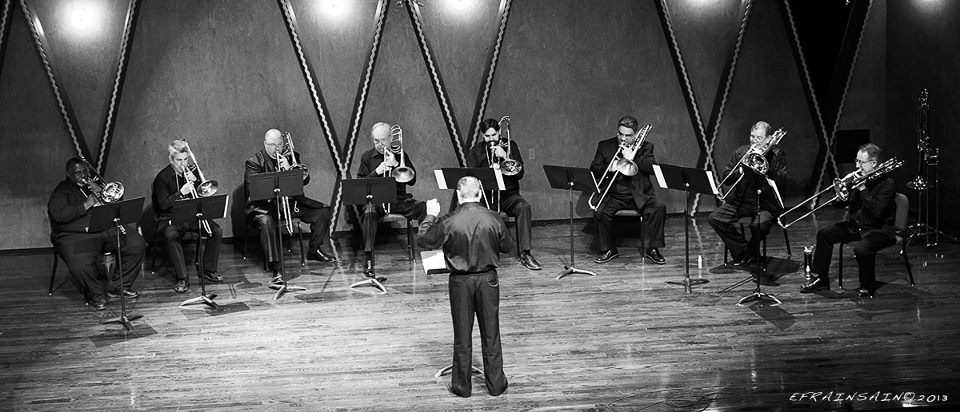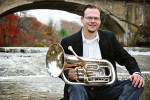 Dennis Bubert is a major force in the trombone world. A large percentage of the content of the Journal of the International trombone Association (ITA), is left to his care each quarter as he places the major symphonic works and players of our time in the spotlight. A native of Central Illinois, Bubert was a student of both Ed Kleinhammer and Arnold Jacobs of the Chicago Symphony Orchestra (CSO), as well as the ITA founding treasurer and bass trombone virtuoso, Tom Streeter. Bubert has held the position of bass trombonist in the Fort Worth Symphony since 1981, and is currently a full time faculty member at the University of Texas at Arlington.
Dennis Bubert is a major force in the trombone world. A large percentage of the content of the Journal of the International trombone Association (ITA), is left to his care each quarter as he places the major symphonic works and players of our time in the spotlight. A native of Central Illinois, Bubert was a student of both Ed Kleinhammer and Arnold Jacobs of the Chicago Symphony Orchestra (CSO), as well as the ITA founding treasurer and bass trombone virtuoso, Tom Streeter. Bubert has held the position of bass trombonist in the Fort Worth Symphony since 1981, and is currently a full time faculty member at the University of Texas at Arlington.
Part of the generation of famed CSO bass trombonist, Charlie Vernon, Bubert came to his professional awakening at a time when George Roberts had received acclaim as a commercial bass trombone soloist, but there was no apparent classical counterweight to this achievement. While Kleinhammer, Ed Anderson and other outstanding bass trombonists were making their mark in the symphonic realm, a universally acclaimed soloist for the instrument had yet to emerge (despite wonderful recordings from Knaub Reynolds, Streeter and others). It was this awakening of the classical bass trombone in the 1980’s which was led by the ever expanding capabilities of Charlie Vernon that have redefined the classical bass trombone nearly as much as Roberts has done for the commercial bass trombone. Bubert represents pedagogy, ability, accomplishment, scholarship and a front row seat to the ride. Enjoy!
1. What do you look for in a horn? Do you use different equipment for different occasions?I think those things that I look for in an instrument aren’t all that dissimilar to what most players find appealing….sound, response, evenness of tone. After having tried so many different variables over the years, I’ve kind of settled on lighter bells and heavier slides. I don’t think so much in terms of “dark†or “bright†anymore; I listen instead for clarity, liveliness, and projection. I like sounds that are “complex†and “interestingâ€, as opposed to monochromatic; and beyond that, I guess, I tend to prefer horns that blow “looseâ€, where the sound can be readily colored to match what’s going on around me. We do use different instruments on occasion based on the repertoire. For earlier literature, and in cases where the first two players are playing an alto and smaller tenor, I generally play on an 88H “K†bell with a .562†slide with an older Conn-style narrow crook. That’s seems to have worked pretty well. The bigger part of the formula, though, will always be the player and the concept.
2. How has having a steady orchestral engagement changed your warm up and practicing?
I’ve always been a huge advocate of having a daily routine, and if at all possible, I like to get that in as early in the day as possible. You know, you can go into rehearsal cold, play a few minutes and be OK, but I really like the comfort of having done my homework on the horn before that rehearsal. For me, it’s just not the same to to go in, play a few notes and then sit down in the orchestra.
The biggest demand on my time is from juggling the orchestra schedule with teaching, and that’s an unending challenge. It means a lot of late night practice sessions, and grabbing an hour of practice time between double rehearsals. Not ideal, perhaps, but if that’s your best option, that’s what you do. When school is over in early May, we still have about eight weeks of the season to go, and I love being able to go down to my basement every morning to be my own best student for a change. It’s a great time of the year to kind of evaluate where things stand, and try to address any little issues that have come up during the past season, as well as look at new literature and get a head start on the next season’s rep.
3. What was it like to experience the ascent of Charlie Vernon’s career, and to witness the corresponding elevation of expectation for the bass trombone?I first met Charlie in 1978, right after I had finished school. He was on the artist roster at the International Trombone Workshop (now “Festivalâ€) in Nashville, and after having heard so much about him in the Baltimore Symphony, I was really anxious to hear what all the fuss was about. He presented a master class and played a recital, and I made sure I was at both of those. I had just completed a really productive two years studying with John Kitzman and Daral Rauscher in Dallas, my lessons with Mr. Kleinhammer were just getting underway, John was using me a lot to sub and play extra in the Dallas Symphony, and I was just a month or so away from winning my first little audition. I kind of felt I was headed in the right direction, and then hearing Charlie….well, that kind of blew everything out of the water for me. His playing, both in terms of sound and musicality, was just so far beyond anything I had conceived of for the bass trombone, that I had to take everything back to the design studio. I remember bugging him for two lessons that week, and even though he probably didn’t have three hours to himself that whole week, he very graciously obliged.
 He really has pulled everyone else along after him. Jay told me once that he thought Charlie had pushed the concepts of Mr. Jacobs’ teaching into greater extremes of register than anyone else. Having his sound in my head at the same time I was studying with Mr. Kleinhammer, and later, Mr. Jacobs, was pivotal for me, as for so many others.
He really has pulled everyone else along after him. Jay told me once that he thought Charlie had pushed the concepts of Mr. Jacobs’ teaching into greater extremes of register than anyone else. Having his sound in my head at the same time I was studying with Mr. Kleinhammer, and later, Mr. Jacobs, was pivotal for me, as for so many others.
4. What memories do you have of your time studying with Tom Streeter and becoming a bass trombonist.
I wish I could say it wasn’t that long ago, but….! My freshman year, I went into my first lesson with my only instrument, a Conn 48H, and came out a bass trombone player. The school’s one and only bass trombonist was graduating, they were getting a new instrument, and they needed someone to step up. I had always had a really easy, comfortable low register, and the upper register was anything but easy, so it seemed like a good choice. Tom was very, very patient with me, always encouraging, and never anything but generous.
At the start of my junior year, Tom left his position in the local orchestra, and mentioned that I might want to get myself ready for an audition. I really had no idea what to expect, but prepared as best I could, and somehow won. (I was so totally green, I left the hall after I played and went home! Not even savvy enough to stay around for another round, or to find out who won…..the next morning at school everybody was congratulating me, and I wasn’t really sure what for…..) It was really a pretty respectable orchestra and a great learning experience for me. The two tenor trombones were players you knew really well, Dave…..John Rehm and Charles Stokes, two theory teachers from Illinois State, but both really fine players who had studied with Beversdorf and Haney at IU. The principal trumpet had formerly been in the Dallas Symphony, and the horn section was really strong. As a 20-year old kid, I was in way over my head, but I really looked forward to those concerts, and nobody had more fun than I did. More than anything else, I think that experience was probably the most influential in inspiring me towards a career in music.
5. Your teaching, articles and extra-symphonic music bespeak an innate curiosity. What keeps you so mentally active, and what are the challenges and rewards. What are the 2 or 3most interesting things you have unearthed?
I just got back from Chicago, Dave, where I heard three different concerts in three nights….the CSO brass concert, a Thursday night subscription, and Music of the Baroque’s Christmas choral and brass concert. And look at those guys….Jay’s conducting, teaching and arranging; Mick Mulcahy conducted the brass concert and then played beautifully on the Music of the Baroque concert (in addition to squeezing in students from out of town), and Charlie’s always got something going on, and ended the brass concert by playing an absolutely gorgeous ballad on the little horn. It occurred to me a long time ago that simply sitting in the back row playing third trombone was not going to be enough to sustain me musically or intellectually for the long haul. If you were playing in Chicago, or Boston, or New York? Well, maybe, but even then, those guys all seem to thrive on a varied musical diet. And if you play in Fort Worth, say, or Loose Gravel, Idaho….I think it’s imperative for your own musical well being to pursue something beyond the demands of the job.
 And another thought along these lines: whether at the end of the day, or the end of the season, or the end of your career, the horn’s going to go in the case and we’d all better have something beyond the trombone to hold our attention.
And another thought along these lines: whether at the end of the day, or the end of the season, or the end of your career, the horn’s going to go in the case and we’d all better have something beyond the trombone to hold our attention.
6. How have your views on Kleinhammer’s pedagogy changed from 30 years ago? (Can you imagine a brass section where he , Jacobs and Farkas were writing their books and conversing?)
I’ve had a long time to reflect on Ed’s teaching, as well as Jake’s, and if my views have changed, my respect for what they were able to pass on has only become more profound. My friend John Hubbard was around the CSO a lot during those years when Jake was doing his studies at the University of Illinois Medical Center, and he may well have been the inspiration for “The Art of Trombone Playing.†He always claimed he told Ed “you’re so damn smart, why don’t you write a book?†After John died in 2005, his wife showed me his copy of the book, with the inscription “to my friend John, who inspired this book,†in Ed’s distinctive handwriting. Ed gradually came to feel that the original book needed to be completely revamped, and that was what eventually led to “Mastering the Tromboneâ€, which he co-authored with Doug Yeo.
Ed told me that a number of his CSO brass colleagues urged Jacobs to write a book, and he apparently always made noises about doing it someday, but of course never did. The general consensus, as I understand it, is that he didn’t want his ideas misinterpreted or misrepresented. I was surprised to learn that at one time there was apparently a sort of backlash against Mr. Jacobs’ teaching. Hard to imagine for someone like you or me, who had the opportunity to watch him work with so many different students during his master classes, or to have been the fortunate recipients of his extraordinary teaching ourselves, as we were.
Both were very involved with what I consider one of the most predominant themes in brass pedagogy over the past three-quarters of the century, but in their own unique way. You’ve no doubt heard the state of trombone playing Emory Remington encountered early in his career, and how his teaching style evolved to urge students to adapt a more singing approach to the horn, blowing into it with as little resistance as possible. This idea of a more relaxed, easy way of blowing the horn was also a major theme in the teaching of both Mr. Kleinhammer and Mr. Jacobs. For Jake, that was reflected in the admonition to “play with minimal motors†and “to seek the weakness in your playing.†Ed, who was quite taken with the Eugen Herrigel book, “Zen in the Art of Archeryâ€, co-opted Herrigel’s expression of “effortless effortâ€. He carried that book around in his jacket pocket from one time to another, and I remember the countless times he bolted across the room to grab it from his coat and read a paragraph. He also talked about “blowing the horn in a spiritual way.â€
I was incredibly, incredibly fortunate to be able to study with those guys, and I’ve often marveled at whatever set of happy circumstances brought them all together at that time in that one place. I don’t think I ever had a lesson with either of them without them invoking the name of Adolph Herseth, and over the years I’ve come to think of them thusly: Herseth as the ultimate artist, Jacobs as the ultimate scholar, and Ed as the ultimate student. Tim Smith told me that a couple of his friends saw Ed at the old Schilke shop on South Wabash once, and screwed up their courage to go over and introduce themselves. “Mr. Kleinhammer? Hi, I wanted to say hello…I’m a trombone studentâ€, Tim’s friend said. “You are?â€, Ed exclaimed…. “I AM, TOO!â€
I have photos of Ed and Jake in my studio at school as well as on the wall of my basement practice area at home, and I can honestly say that not a single day has passed without thinking about my time with them. Truly extraordinary individuals, and the giants of our art on whose shoulders we stand. I told Charlie last week that I can’t walk down Michigan Avenue or be in the basement of Orchestra Hall without sensing their presence.
7. What has been your involvement with vintage horns. Any favorites?
Right now, my daily driver is a 1958 Mt. Vernon with two newly installed Greenhoe valves. I bought it from my good friend and colleague Steve Dunkel at Kennedy Center, and when I retire, it goes back to him. And I just bought a beautiful 1948 Conn 70H this past summer which, while I haven’t had much opportunity to use it yet this season, should be great for Schubert, Schumann, etc.
I’ve also got the instrument Mr. Kleinhammer played for the last dozen years or so of his CSO career, an Earl Williams bell with a dual bore slide by John Haynor, Meinl valves and attachment tubing handcrafted at the old Schilke shop. There’s quite a story about how Schilke came into possession of that Williams bell, but I think I’ll leave that to Jared Rodin, who spins a pretty good tale about it.
8. Red herrings are a literary device used by mystery writers to throw readers off the track. Do you see any red herrings or unfruitful pursuits in the advancement of the bass trombone at the moment?
Red herrings? I don’t know about that, but there is one unfruitful pursuit, as you put it, that I frequently encounter in students. And that’s students who are so enamored of some of our more prominent trombone personalities, like Joe and Charlie, that they’re obsessed with trying to emulate them. Those two are marvelous trombonists and musicians, but as wonderful as they are, I think it’s important for us as musicians and instrumentalists to find our own voice. It’s hard enough to be yourself without trying to be someone you’re not.
Interested in more “Seven Positions” tm interviews? Click here for links to nearly two dozen interviews with the most amazing bass trombonists of our time!
c. 2016 David William Brubeck All Rights Reserved.
Interested in more “Seven Positions†tm Interviews?
Charlie VernonJames MarkeyChris BrubeckDoug YeoJeremy MorrowTom EverettGerry Pagano Ben van DijkRandall HawesDenson Paul PollardThomas MattaFred Sturm Bill ReichenbachMassimo Pirone Erik Van Lier Jennifer WhartonMatyas VeerStefan Schulz
Images courtesy of Dennis Bubert





